Will Russia, Iran, Hezbollah and Iraqi Shiite Militias Defeat ISIS in Syria and Iraq?

NEWS JUNKIE POST
Oct 7, 2015 at 9:50 amLame duck US president is MIA on Syria and Iraq
Vladimir Putin made his move on Syria a couple of weeks ago in a well-planned deliberate fashion, seizing the strange political vacuum in the White House. Washington is already in a full-blown election cycle and scrambling to keep the appearance of competency in foreign affairs. The Obama administration is now fully leading from behind: reacting on events, and not anticipating much of anything. Foreign-policy decisions made for the past seven years have turned out to be a complete fiasco. Since the invasion of Afghanistan in 2001 and Iraq in 2003, the footprint of the West in the Middle East and South-East Asia has been enormous and overall a complete disaster. Some policymakers in Washington, Paris, London and Berlin are fully aware of this, even though they would never acknowledge it in a public statement.
The ISIS jihadist mercenary army that Russia, Iran and Hezbollah have to fight now in Syria and Iraq was largely created, with the full knowledge and support of the West, by their regional allies Saudi Arabia and Qatar. The Saudi man in charge of Syria’s dossier was the now-disgraced Prince Bandar (AKA Bandar-Bush). There are so many conflicting narratives in Washington that it is hard to pinpoint who is in charge of the situation with ISIS in both Syria and Iraq. But it is clearly not the so called leader of the free world. The key moment for Putin to green light his military operation in Syria was unquestionably the visit of Israel’s PM Netanyahu to Moscow a couple of weeks ago. Israel and Turkey, the two regional players, allies of the West with real armies, had to be consulted and more or less on board before a full-blown Russian and Iranian military involvement could occur in Syria. It is likely that both Netanyahu and Erdogan gave Putin the explicit guarantee that they would not interfere with Russia’s military operations in the works. They are indeed staying on the sideline and, in the case of Turkey, not assisting ISIS or al-Nusra anymore.
The influence of Saudi Arabia and Qatar is about to be downgraded
Saudis and Qataris sold Washington the notion that the methods to topple of Gaddafi in Libya could be easily applied to topple Bashar al-Assad in Syria. The so-called Arab Spring of 2011 was hijacked by Sunni autocrats and Washington neocons to turn the energy of a movement into regime-change policy. What they did, in reality, was finance and arm a 70,000-strong jihadist foreign legion with territorial ambition. They have weapons to fight and plenty of resources through the oil fields under their control. ISIS is the latest Frankenstein of the West and their Gulf-State allies. The battle-hardened jihadist soldiers of fortune are their own masters and have an agenda of territorial expansion to recreate a Caliphate.
It is likely that the Americans, their European and regional Sunni allies will stay on the sideline while Russia, Iraqi Shiite militias under command of Iran’s Revolutionary Guard, and Hezbollah fight ISIS. The West will be quite happy to stay out of the way. The narrative in Washington is full of contradictions. While Mr. Obama is more or less stuck in his 2013 talking point of “Assad must go,” Joe Biden on October 2, 2015 admitted that since 2011, it has always been a challenge to find “some moderate Syrian able to fight Assad.” As matter of fact, moderates of the so-called Free Syrian Army have always been harder to find than a needle in a giant hay stack.
So far, Russia’s plan in Syria has been astute and correct. Russian jets have been degrading ISIS strongholds, command centers, ammunition depots and oil fields. Once this is achieved, it is likely that a ground operation will start. Russian troops and whatever is left of Assad’s forces will come from the Allawite-controlled north, while Hezbollah will move more forces from Lebanon in the west. In a coordinated fashion, Iraqi Shiite militias and even Iraqi troops, under Iranian command, will come from the south to take back ISIS-controlled areas of Iraq. The jihadist army will have nowhere to go, but they are likely to be formidable opponents using their tanks and armored vehicles, all proudly made in the USA, and they will have snipers in position blending into the ruins of Syria. Regardless, if the coalition of Russia, Iran and Hezbollah commit enough troops on the ground, they should unquestionably prevail.
What could be the geopolitical outcome of Russia’s regained role in the Middle East?
At the start of the so-called Syrian revolution against Assad, Russia’s mistake in dealing with Bashar al-Assad was not to put pressure on him to sideline his mercurial and borderline sociopath brother Maher al-Assad. Syria is destroyed: it is literally tabula rasa. The best outcome, which might be the only option, will be to structure Syria as a federation with a map that follows sectarian divisions, which have become extreme. Once ISIS is defeated by Russia, Iran and Hezbollah, Syria will need something like the Marshall plan that was conceived to rebuild West Germany after World War II. The leading culprits of the destruction such as Saudi Arabia, Qatar, the US, the United Kingdom, France, Germany and Turkey should contribute the most. Perhaps then, millions of Syrian refugees can come back from Turkey, Jordan and elsewhere and start a slow process of rebuilding and relearning to cohabit despite the bloodshed, trauma, and misery that they have experienced.
In Iraq, the same process of reconciliation must take place between Shiites and Sunnis. Once the Russian-led coalition prevails against the jihadists, Iran will probably gain a lot of regional geopolitical clout, in direct proportion to the likely diminished influence of Saudi Arabia — currently meddling in Yemen’s affairs — and Qatar. Perhaps the regain of influence of Russia in the Middle East will be a source of stability for the region. After all, Syria has been an ally of Russia in the region since 1946 and, during that time, it was not a source of major regional conflict in the Middle East. Ultimately, it is in the interest of Washington and even more Europe that this coalition of Russia, Iran, Iraq’s Shiite militia and Hezbollah succeed in crushing ISIS and flushing it out. Meanwhile, while Putin is playing a shrewd geopolitical chess game, the West is playing checkers.
Editor’s Note: For more from Gilbert Mercier on the fight against ISIS in Syria and Iraq, read The Orwellian Empire, available as a paperback from Amazon.
Related Articles
- May 28, 2013 Qatar, Saudi Arabia, Israel and the West’s Unholy Alliance to Wreck and Exploit
- November 30, 2015 Will Turkey Be Kicked Out of NATO?
- July 7, 2017 Welcome to Hell for Capitalists Who Wreck and Exploit
- September 19, 2015 Migrant Crisis in Europe: The West Is Collecting on Its Misdeeds in Iraq, Libya and Syria
- December 8, 2012 NATO’s Pending Move on Syria: Geopolitics of Chaos
- June 20, 2014 Rise of ISIS: West, Saudi Arabia and Qatar are Responsible for Talibanization of Iraq

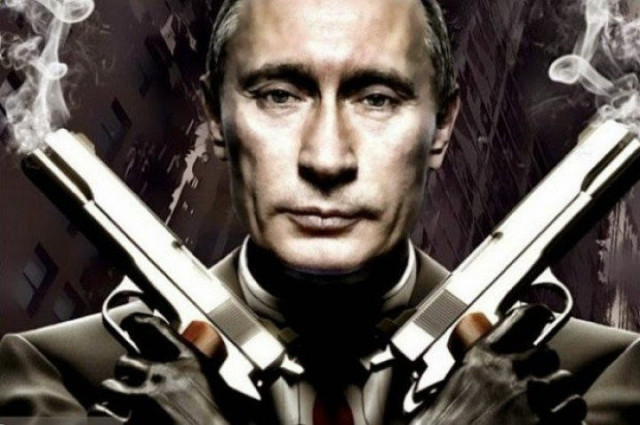
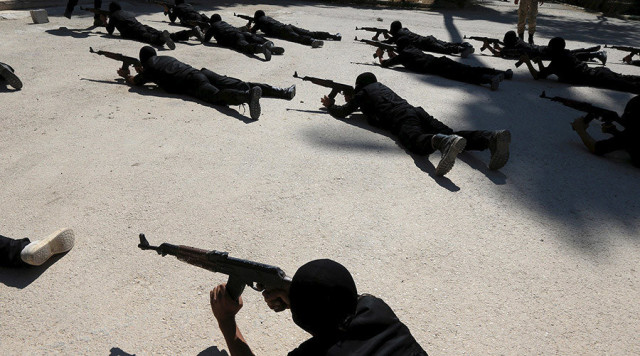
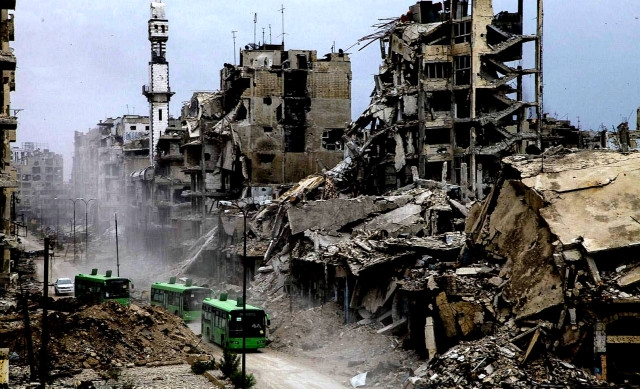
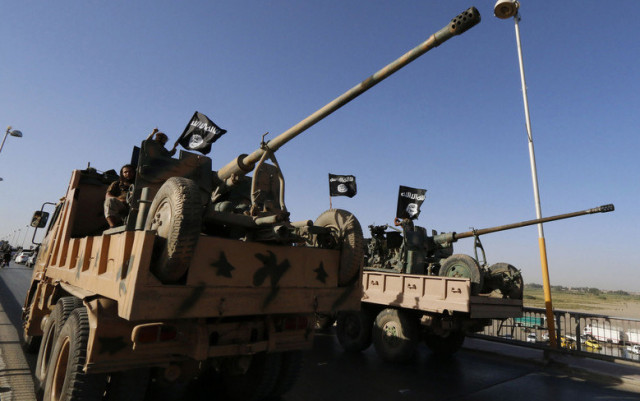
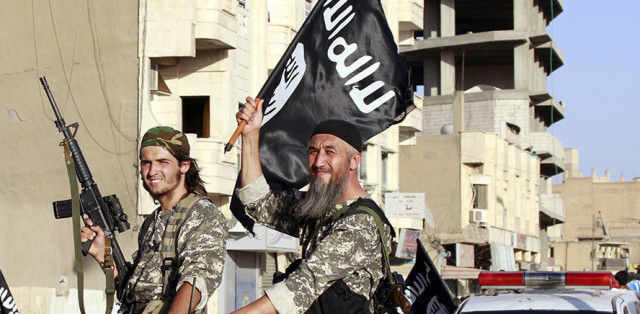
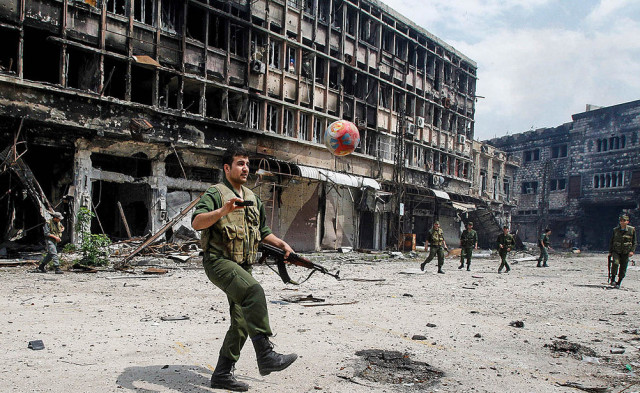
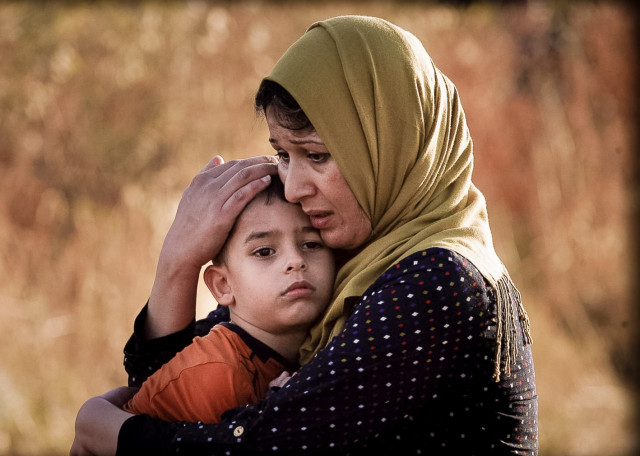
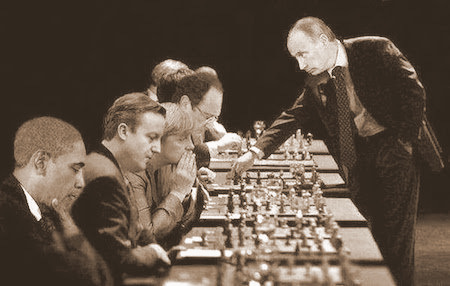











You must be logged in to post a comment Login